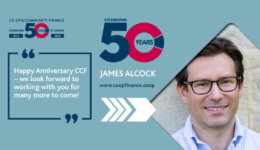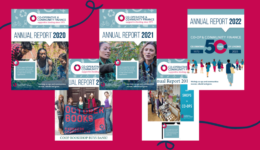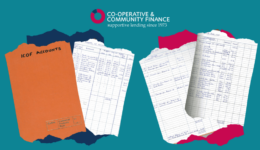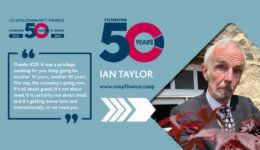Today in our series looking back at the people who’ve been part of ICOF over the last fifty years, we speak to someone to whom many of you will need no introduction. Ian Taylor was part of ICOF for thirty years and he’s been mentioned by many of you. Over to you Ian…
“I think what puzzles many people is how and why ICOF has lasted so long – for fifty years. It’s an incredible achievement. But when you see the very essence of ICOF, it’s not that incredible because it’s about people and for people.
The inspiration for ICOF in the early days, and certainly carried through to my time was EF Schumacher, he’s famous for Small Is Beautiful : A study of economics as if people mattered. We carried those straplines on some of our documents. The belief in common ownership, creating collective benefit through collective action, appeals to investors and donors, funders, staff, trustees and borrowers. That’s the essence of ICOF, it’s about people who are interested in people, lending to those people, because of what they are trying to achieve. It was further enhanced by a particular policy of ICOF, which is still in place: the refusal to take personal guarantees. If you move to a village and there’s a village green, you all benefit from it, when you move, you don’t take a piece of the green with you – if there is no personal gain, there shouldn’t be personal loss. That’s my belief – the coop itself outlives the members, members come and go as caretakers. And that always singled us out from virtually all other lenders, particularly banks, but other social financiers as well.
ICOF’s approach is appreciated, especially by Borrowers – they see the money that they’ve borrowed, being repaid, relent, and lent again and again, to similar organisations to themselves. So it’s kind of creating a network, it’s about knowing where their money’s come from, and where their money goes back to and that results in very low loss rates. Loss rates, even at the height of recessions, were at about 3%. Banks rarely achieve such rates. When you think about what the UK economy has gone through in fifty years – the early 80s recession, which was horrendous. The early 90s recession; the Great Recession in 2008 and then the COVID recession – and our losses were always low. I think the reason for that is people recognise and fully support what we do: its friendly finance meeting need and not greed.
On a personal note, I’ve been very fortunate in my working life in being able to get jobs that enabled me to keep my principles. Before ICOF, I was working with long term unemployed people in a community action project called Capital Jobmate with Capital Radio. I’ve also been involved in regeneration, urban and rural. And I was one of two founder members that set up a common ownership manufacturing worker co-op – Blackwall Products -in 1983.
And then in 1987 I heard there was a job running a Loan Fund for ICOF in West Glamorgan. I applied and had the interview on a Friday, heard I got the job on the Saturday and we bought a house on the Sunday – my partner and I – and our entire lives changed. I was taken on as lending officer for West Glamorgan and the area expanded almost to the whole of the UK over the years. I became Investment Manager in 1998 until 2016 when I retired. I then went to art college.
Nowadays, worker coops themselves, even common ownership ones, have been overshadowed by the growth in community benefit societies which are common ownership themselves. People working together collectively for an identifiable benefit – so there’s no personal gain. I suppose initially, I saw co-ops as a kind of a trial for people working locally, to help each other locally, a kind of decentralised economy, which is what Schumacher discussed in Small Is Beautiful.
Over the years, there were lots of internal conflicts their resolution crucial to the development of ICOF. Things like interest rates – their level and whether or not they should be market driven – personal guarantees, loans to privately owned small businesses, the role of the CEO – whether to have a CEO – employee ownership development. All of these things were debated and probably will be again.
One of my most enjoyable and productive relationships was with Peninsular Trust in Cawsand in South East Cornwall. I visited a number of times but a very early visit was the most memorable for all the wrong reasons.
I had arranged to meet Simon Ryan in a car park but there was no sign of him. He rang and gave detailed directions to where he was waiting which I followed religiously, but only to end up in another car park which was the car park that I had just left. Not only was I in the wrong car park, I was in the wrong village. Simon came to the rescue.
Marged Shoes was a women’s shoe making co-op in deepest rural Wales. They were radical lesbian feminists who worked and lived on the premises. Visiting to appraise their loan application required a female escort. Luckily, a feminist lesbian CDA worker was on hand. It wasn’t so scary, in fact it turned into a very productive relationship with me photographing their products and organising promotional materials and even buying boots for presents. Perhaps they were social feminists rather than radical.
When I talk about ICOF, I still say we – and I left seven years ago. It was a huge part of my life, and a part of which I feel proud. On retiring I went to art school and tried to have fun, but it was a poor alternative to working. I find art really stressful – I never found ICOF that stressful!
So thanks ICOF it was a privilege working for you. Keep going for another 10 years, another 60 years. The way the economy’s going now, it’s all about greed, It’s not about need, it is certainly not about small and it’s getting worse here and internationally, so we need you.”










